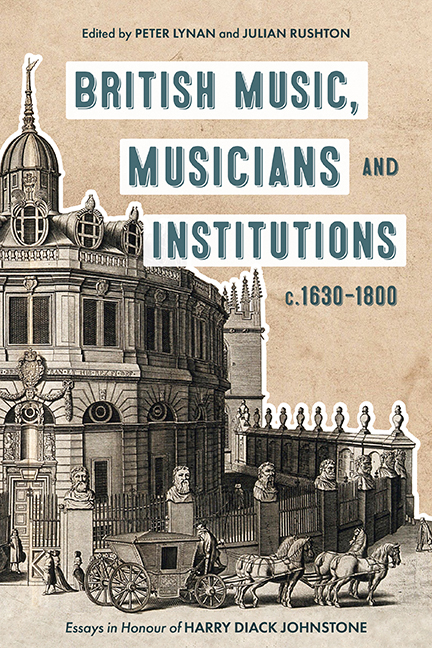Book contents
- Frontmatter
- Contents
- List of Illustrations
- List of Music Examples
- List of Contributors
- Acknowledgements
- List of Abbreviations
- Note to the Reader
- Introduction
- Part I Performers and Performance Style
- Part II Composers and Secular Institutions
- Part III Sacred Music and Institutions
- Part IV Dissemination: Copying, Printing, and Publishing
- Epilogue: Musica Britannica and the Eighteenth Century
- Harry Diack Johnstone: A Tribute
- Bibliography of the Publications of Harry Diack Johnstone
- Index
- Tabula Gratulatoria
7 - James Lates of Oxford and his Sixteen Minuets
Published online by Cambridge University Press: 06 October 2022
- Frontmatter
- Contents
- List of Illustrations
- List of Music Examples
- List of Contributors
- Acknowledgements
- List of Abbreviations
- Note to the Reader
- Introduction
- Part I Performers and Performance Style
- Part II Composers and Secular Institutions
- Part III Sacred Music and Institutions
- Part IV Dissemination: Copying, Printing, and Publishing
- Epilogue: Musica Britannica and the Eighteenth Century
- Harry Diack Johnstone: A Tribute
- Bibliography of the Publications of Harry Diack Johnstone
- Index
- Tabula Gratulatoria
Summary
James Lates (?c.1740–1777), performer, composer, and teacher, was well known in Oxford in and beyond his lifetime. His name surfaced occasionally in nineteenth-century reference literature. J.H. Mee, in his indispensable history of the Holywell Music Room, noting apropos the ‘little band of musicians who formed the staff of the Music Room’ in the early years of its existence that ‘occasional glimpses of individual musicians are to be had’, added discouragingly that ‘Some […] such as Lates, Lambourne, and Miss Reynolds, remain mere names.’ Lates has emerged from that obscurity since Mee's pronouncement. Stanley Sadie's special interest in eighteenth-century English chamber music secured a place for him in the New Grove (1980). His published opuses have been noted as contributing to the development of English string style, while his collection of ‘Sixteen Minuets for Violin’, apparently unpublished, and preserved in a manuscript copy acquired by the British Library in 1999, raises questions of genre and purpose. The main part of this chapter first examines aspects of Lates's life and work, and the factors that shaped the development of his career, in the context of musical life in eighteenth-century Oxford and its environs; and secondly considers the conundrum presented by his Sixteen Minuets.
❧ Life of James Lates
The earliest sighting in the local press of Lates's activity as a musician is in 1757, when Jackson's Oxford Journal advertised a benefit concert ‘for Miss Lates’ (probably his sister), which was to be held on 8 November at the Town Hall in Abingdon. There would be ‘perform’d a Concert of Vocal and Instrumental Musick’, featuring ‘particularly Selected Concertos, Duets, and a Solo on French Horns’, ‘the vocal part (English and Italian) by Miss Lates’, and ‘the First Violin and Solo by Master Lates’. The concert was evidently to be a grand occasion followed by ‘a Ball and Cards’. Tickets could be obtained at the Globe Coffee House and the Town Hall in Abingdon, ‘and at Signor Lates's house in Friar’s-Entry, Oxford’. Lates's family background was in some respects relatively unusual for its time and place. His father, the scholar David Francisco Lates (or Lattes), was a Jewish convert to the Christian faith, who taught ‘not only Hebrew, of which he published a grammar at the Oxford University Press in 1758, but also modern languages and music’
- Type
- Chapter
- Information
- British Music, Musicians and Institutions, c. 1630-1800Essays in Honour of Harry Diack Johnstone, pp. 129 - 142Publisher: Boydell & BrewerPrint publication year: 2022

